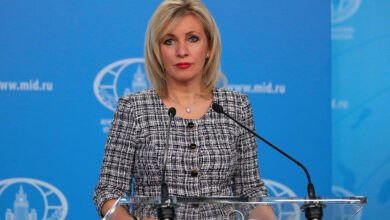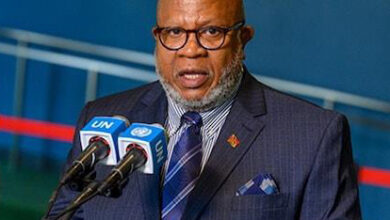India Gets Ready for BRICS Summit as Ministers Set ‘New Milestone’
New Delhi. As the series of (close to 50) meetings in the run up to the BRICS Summit come to an end, the focus is shifting to Goa, where arrangements are in full swing to ensure that the summit of leaders from BRICS is a productive, successful one.
The BRICS (Brazil, Russia, India, China, South Africa) calendar year is packed with almost 50 meetings across a whole range of sectors which are held in the run-up to the Summit of leaders from the five member countries.
The Ministry of External Affairs (MEA) has informed the host state Goa that close to a 1,000 senior delegates, officials and ministers are expected to arrive in Goa in the second week of October, for the senior officials’ meeting, followed by the meeting of foreign secretaries and foreign ministers of the five countries, just before the heads of state arrive for their meeting. Goa will host the BRICS summit on October 15 and 16.
China and Russia are each expected to send 300 delegates for the Eighth (8th) BRICS Summit.
To get ready for the event, Goa is busy paving roads and ensuring the road infrastructure is of world standards, while the state is also investing in beautification of places of interest, to promote itself as a major tourist destination during the Summit.
The runway in the civil enclave of the Indian Naval air station at Dabolim would receive direct flights of the foreign dignitaries, who include Russian President Vladimir Putin, Chinese President Xi Jinping, President Jacob Zuma of South Africa and Brazil’s interim President Michel Temer. India’s Prime Minister Narendra Modi will host the Summit.
Among the last official and meetings held before the Summit was the meeting of Ministers from the five BRICS countries on disaster management. They resolved to set up a dedicated Joint Task Force for Disaster Risk Management, which would hold regular dialogue and exchanges while extending mutual support and collaboration among each other, Minister of State for Home Affairs Kiren Rijiju said.
In the run-up to the Summit, the two-day meeting of BRICS ministers on Disaster management ended in the Indian city of Udaipur August 23. The ministers adopted the Udaipur Declaration, outlining the common thread of challenges all BRICS nations face against disasters, both natural and man-made. The joint task force on disaster management would work as a permanent forum for regular dialogue and mutual support among the member nations.
Mr Rijiju said the meeting was “a new milestone in collaboration and cooperation among BRICS countries in the field of disaster management. The Udaipur Declaration would be presented at the Summit of the leaders to be held on October 15 and 16, and be adopted as one of the “significant, workable areas of joint collaboration,” an official told India Strategic.
“Given the frequency and regularity with which particularly natural disasters strike, this is a very important initiative,” said the official, who did not want to be identified.
Mr Rijiju said the ministers has agreed on a roadmap for implementation of the Joint Action Plan, “where all of us have resolved to work together on exchange of information/ experiences on disaster management, research & technology exchange on forecasting and early warning for floods and extreme weather events and capacity building of stakeholders for disaster management.”
“India is a disaster-prone land and we have one of the largest and efficient Disaster Response Force in the world. China is an expert in handling earthquake situations, while Russia leads in managing wildfire incidents. Therefore, there would soon be a common platform and roadmap for the BRICS members to share and gain from each other’s expertise and technologies,” Mr Rijiju said after the meeting.
BRICS nations have moved from a relief-centric approach to a holistic approach to disasters, with greater emphasis on prevention, mitigation and preparedness.
Perhaps the most active and relevant activity that BRICS actually does is to tackle the huge menace of drugs and narcotics smuggling worldwide. India hosted a meeting of the heads of anti-narcotics agencies to discuss issues related to narco-terrorism and money laundering among the member nations.
When BRICS, which has been dismissed by some Western commentators as “a talking shop of fading relevance,” decided to jointly tackle the menace, it was “perhaps the most real and relevant activity” the bloc has undertaken, more so even than the BRICS New Development Bank, an official told India Strategic.
The initiative against drugs can bring the informal bloc back to centre-stage, the official said.
Representatives of Brazil, Russia, India, China and South Africa met in New Delhi on July 8 to find ways to tackle and curb the threat of drugs during a BRICS Anti-Drugs Working Group meeting. The working group signed a protocol at the end of the meeting, adopting best practices and firming up closer cooperation.
These recommendations will be incorporated in “at least three or four paragraphs” of the joint declaration that will be adopted by BRICS leaders at the Goa Summit in October, an official told India Strategic.
Union Home Minister Rajnath Singh inaugurated the Anti-Drug Working Group meeting, saying it was “the need of the hour that BRICS expanded its mandate to cover and discuss issues relating to trafficking of narcotics and the looming menace of narco-terrorism.”
Mr Singh said India “attaches a lot of value to the BRICS as an Association of fast developing economies,” and the high-level meeting against drugs was a vital component of the initiative, especially since BRICS populations comprise such a large percentage of young people.
India assumed the presidency of BRICS from Russia on February 15 this year, and will hold the chair till the end of the year.
Another recent meeting, important in the run-up to the Summit, was the BRICS Development Partnership Administrators’ Meeting, which ended in New Delhi on August 7.
According to the MEA, the two-day meeting “provided an opportunity to member states to better understand the structure of their respective development cooperation programmes and saw fruitful exchanges among the BRICS member states on key issues of global, national and sectoral significance in the field of development cooperation.”
Member states “shared knowledge on their best practices and the challenges to be approached and mitigated through policy actions in this field and deliberated on promotion of cooperation among themselves in line with their national priorities,” the MEA release said. “Besides, they exchanged views on the emerging global development architecture.”





